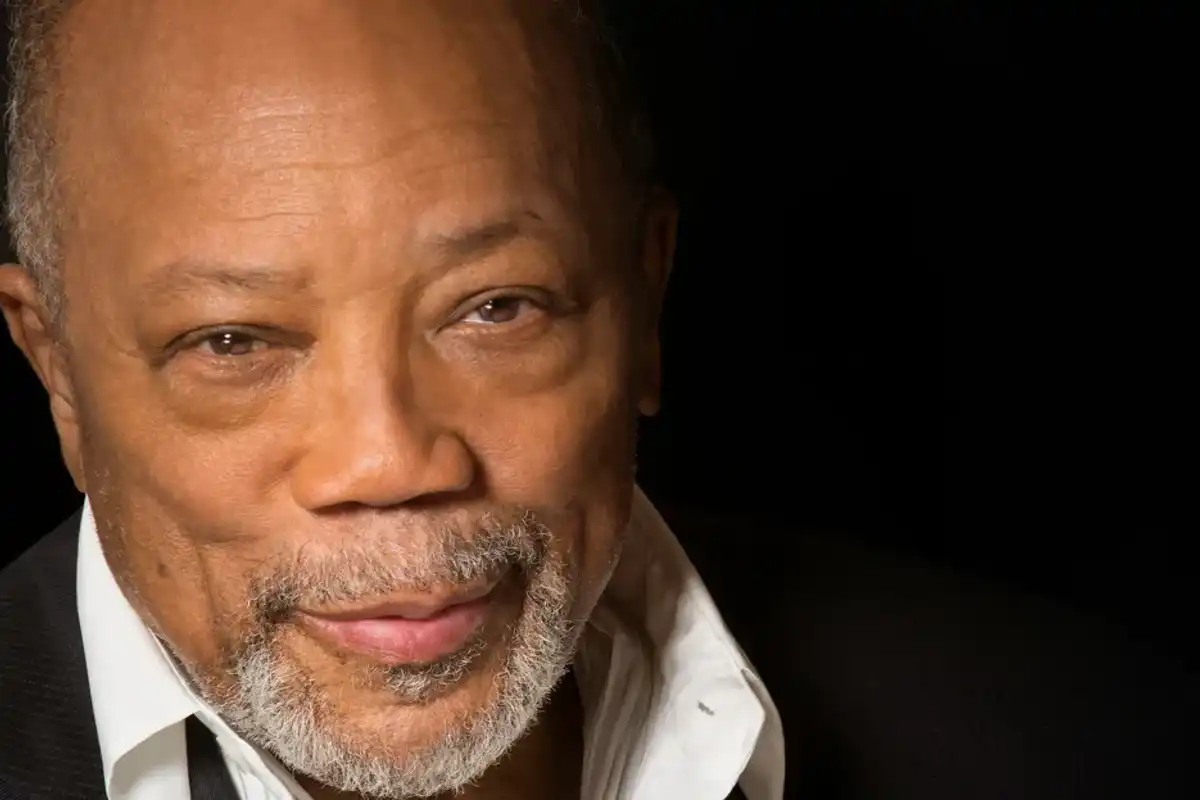Obituaries: Music Legend Quincy Jones, Jazz Pianist/Composer Stacie McGregor
This week we also acknowledge the passing of Buena Vista Social Club member Manuel "Guajiro" Mirabal and Czech cellist and composer Vojtěch Havel.

Quincy Jones
Quincy (Delight) Jones, an iconic figure in American popular music, died on November 3, at age 91.
A Billboard obituary described him as “the musical giant whose six-decade, barrier-breaking career encompassed many creative personas—musician, songwriter, producer, conductor, arranger, artist, record label owner and executive, TV/film producer, magazine publisher and humanitarian.”
Another music legend, Clive Davis, told Billboard in 2013 that "Quincy Jones is the ultimate music renaissance man. He is ever young, ever vital, with an imagination as large as the biggest heart in the world.”
Jones is the most-nominated artist-producer in Grammy Awards history, with 80 nods, including 28 wins. In 2013, he was inducted into the Rock & Roll Hall of Fame in the Ahmet Ertegun Award category.
He scored countless hits as a record producer and was at the helm for Michael Jackson’s best-selling albums Off the Wall, Thriller and Bad. He started scoring hits in the early '60s, after taking the A&R helm at Mercury Records in 1961, as the first African-American to serve as a VP at a major label.
After studying music at Boston’s Berklee College of Music, Jones toured with Lionel Hampton as a trumpeter, then made a real impact as an arranger for such stars as Ray Charles, Sarah Vaughan, Dinah Washington, Duke Ellington and Gene Krupa.
As a solo artist, Jones signed with ABC Paramount Records in 1956 and then worked in Paris for a record label and as leader of jazz band The Jones Boys.
Jones began working with Frank Sinatra in 1958 as an arranger. Work on Sinatra’s 1964 album It Might as Well Be Swing with the Count Basie Orchestra led to Jones’ first Grammy win. He continued to work extensively with Sinatra.
Jones also achieved major success as a film composer in the 1960s, first scoring Sidney Lumet’s The Pawnbroker in 1964, then composing the music for two of the most important films of 1967, In the Heat of the Night and In Cold Blood.
He also wrote the memorable theme songs for such series as The Bill Cosby Show, Ironside and Sanford and Son. Quincy Jones’ 1962 flute and horn instrumental “Soul Bossa Nova,” was used as the theme for a popular Canadian television game show called Definition, and it became part of Canadian music history when Toronto hip-hop duo Dream Warriors sampled it heavily for their jazz-rap single, “My Definition of a Boombastic Jazz Style.” That track became an international hit, sold gold in Canada, earned a Juno award and was inducted into the Canadian Songwriters Hall of Fame in 2023.
The song has other Canadian connections too, for comedian Mike Myers used it as the theme tune for his James Bond parody film series Austin Powers. In 2014, Jones executive produced Canadian jazz singer Nikki Yanofsky's album Little Secret, which featured a song entitled "Something New" that interpolated melodic references to "Soul Bossa Nova."
In 1998, Jones attended the Juno Awards to induct fellow star producer/arranger David Foster into the Canadian Music Hall of Fame.
Justifying Clive Davis' tag as a renaissance man, Jones also scored big as a film and TV producer. He obtained the rights to the novel The Color Purple and chose a young Oprah Winfrey to star in Steven Spielberg’s 1985 Oscar-nominated film adaptation. He also executive produced The Fresh Prince of Bel-Air, starring rapper and then-novice actor Will Smith, and In the House, starring LL Cool J.
Further cementing himself in popular music history, Jones produced the historic recording sessions for the 1985 all-star charity single and Billboard Hot 100 No. 1 “We Are the World.”
Read more about Quincy Jones' life and career here.
Stacie McGregor, a Juno-winning Canadian jazz pianist and composer, died on October 30, of cancer, at age 62.
Her partner of 29 years, Greg Gooding, a Juno-winning music producer and owner of independent music label/publishing and production company G-THREE, shared the news in a message to friends. The statement notes that "On October 30th, at 3:55 PM, Stacie left us after a courageous five-year battle with cancer. In her characteristic way, she chose to keep this struggle private, continuing to perform, record, and share her love for music without letting illness define her."
In its obituary, Toronto radio station JAZZ.FM91 termed McGregor "a distinguished Canadian jazz pianist and composer whose contributions have left an indelible mark on the music community."
"Known for her passionate performances and her depth as a composer, her journey in music began in Winnipeg, where her talent was evident from a young age. By twelve, she had already garnered national attention, placing third in the Yamaha Songwriting Competition. Her early mentor, Winnipeg jazz legend Ron Paley, recognized her potential and encouraged her to move to Toronto to attend Humber College’s jazz program — a decision that would shape her extraordinary career."
After graduating, McGregor became very active on the Toronto scene, working with artists in diverse genres. As part of Madagascar Slim’s band, she won a Juno Award in 1999 for Best World Music Recording, for the album Omnisource, produced by Greg Gooding.
She performed regularly at such Toronto venues as Robert’s in Kensington Market, and at Nawlin’s in the Entertainment District, where she performed nearly every weekend for almost two decades.
In 2003, McGregor released her debut album, Straight Up, a set of compositions arranged for an all-Canadian ensemble featuring such A-list artists Kevin Turcotte, Brandi Disterheft, and Archie Alleyne. The album gained international acclaim, charting in over 20 countries and establishing her as a leading voice in Canadian jazz. Her second and third albums as a bandleader — SWIFT and Rhythm, Hart & Soul — showcased her collaborations with notable musicians such as Billy Robinson, Billy Hart, Curtis Lundy and Santi DeBriano.
In 2015, acclaimed jazz drummer Archie Alleyne, described as a longtime mentor of McGregor, asked her to continue the legacy of his hard-bop band, Kollage, as its musical director. Honouring his wishes, she led a new lineup of the band and recorded No Fuss, No Muss in 2017 (on G-THREE), a project that featured original group compositions.
From 2010, McGregor performed and recorded with acclaimed Toronto quartet Heillig Manoeuvre, headed by former Manteca bassist and musical director Henry Heillig and also featuring Alison Young and Charlie Cooley. The group released four albums. Heillig recalls to Billboard Canada that "way back in the early '90s, Stacie and I worked together in some wacky but unmemorable ensembles. Even then she was a wonderful musician, who could play synth, organ and piano with equal aplomb. And she was a wonderful companion in those less than stellar ensembles."
"In 2010, after resigning as musical director of Manteca, I started jamming with Stacie and drummer Charlie Cooley. When Alison Young joined us one day, I immediately knew I had found my perfect quartet. And so it has been for 14 years. When I brought in my compositions, created with my basic harmonic toolkit, Stacie would take what I’d written and add wonderful new colours with her subtle chords and voicings. I owe her so much for putting the polish on my creations.
"Stacie’s exuberant dynamic playing was the heart of our band; adventurous, always rhythmic, in her solos and accompaniment. And she really went to town when she had a grand piano to dig into. In 2017, Heillig Manoeuvre toured out west for 8 days. This was a very special time for all, able to hang out as friends as well as workmates. I’m so grateful for my time with her."
The list of elite Canadian and American artists McGregor toured, recorded and performed with also includes Aura, Jackie Richardson, Alexis Baro, Pat LaBarbera, Shakura S’Aida, Kevin Turcotte, Jim Heineman, Chris Mitchell, Paul Novotny, Mark Kelso, Dave Young, Ori Dagan, Laura Fernandez, Mike Malone, Colleen Allen and Neil Swainson.
Greg Gooding notes that "Stacie’s love for music extended beyond the stage; in her final years, she found immense joy teaching piano to children at Forest Grove Church. Even as she faced her own struggles, she continued to give, pouring positivity and kindness into every life she touched."
McGregor was nominated for Ontario’s prestigious Louis Applebaum Composers Award, which celebrates excellence in music composition, and was nominated twice for the Grand Prix de Jazz General Motors and the Prix Étoiles Galaxie de Radio-Canada award at the Montreal Jazz Festival.
On social media and to Billboard Canada, many of McGregor's musical peers offered tributes to their colleague and friend.
Juno-winning bassist and composer Brandi Disterheft featured McGregor in her ensemble, and she provided Billboard Canada with this tribute: "Stacie was one of the most commanding jazz musicians I’ve played with. Her time propelled and swung the entire band forward whilst her prowess on the piano resembled a fearlessness and humbleness I felt similarly to performing with Hank Jones.
"A great jazz artist is one who not only performs and composes, but who raises the bar for generations of artists around them and in turn changing the course of jazz. She could emulate and was rooted in the traditions of jazz language, yet developed her own contagious, fierce style. She was my greatest female mentor. I strived early on to copy Stacie’s professionalism, confidence, dexterity, and artistic freedom to just improvise any direction the music takes you. She will be greatly missed."
Toronto jazz vocalist Ori Dagan performed with McGregor, and he posted this homage on Facebook: "It's hard to put into words…Stacie McGregor was a piano master, a gem of a human and a soul who will be deeply missed. Thank you for your music, your talent, your kindness, your friendship. Love you forever Stacie."
To Billboard Canada, Dagan added that "Stacie’s brilliant ears were matched by a heart of gold. She was the consummate collaborator, always elevating the music to a higher place. She enjoyed rehearsing as she wanted to make sure she did a good job; she took the music very seriously but in contrast, she was a very cool and unpretentious person to hang with after the gig.
"Musically, beyond her supportive accompaniment skills, I absolutely loved her soloing so much! She had many great ideas, one never knew what her next solo would sound like. I really think she was one of the best players on the scene, a well-kept secret for some because she was so low-key, humble, and down to earth.”
On Facebook, jazz vocalist Terra Dawn Hazelton posted a tribute that reads in part: "I’m incredibly sad to hear of Stacie McGregor’s passing. My heartfelt condolences to her family and all of her friends and colleagues. I was very lucky to have worked with Stacie for a few years in Brandi Disterheft’s band. To say I learned a lot in that band would be an understatement. Stacie was a monster pianist and a fascinating human.
"We had the thrill of touring across Canada together from Vancouver Island to a wild time in NFLD. Stacie and I shared hotel rooms sometimes, and I always enjoyed my chats with her. I remembered thinking how cool and wise she was, and how humble for someone with such a monster talent. I spent my 30th birthday on stage in Montreal with that band. It was a birthday I will never forget. Stacie, you and your music will live on forever. Hugs to all the gang in Toronto."
Veteran Toronto drummer/bandleader Mark Kelso (Molly Johnson, The Jazz Exiles) gave this tribute to Billboard Canada: “Stacie and I first met when we played together in the Humber College A-band back in 1982/83. Even then she was a brilliant pianist and a very serious musician. More recently we played in Colleen Allen’s group ARCC. I’ll miss her wonderful sense of humour and her great laugh, as well as her beautiful piano playing."
International
Vojtěch Havel, an influential Czech cellist and composer, died on October 21, of heart failure, at age 62. He is best known for performing with his wife, in the duo Irena & Vojtech Havlovi (Havel).
A Pitchfork obituary reports that "Irena & Vojtěch Havel made acoustic ambient music that drew from American minimalism, European early music, and Eastern philosophies. The Czech writer Pavel Klusák notes that 'In the massive echo of Prague’s gothic and baroque temples, the minimal music of the Havels flew and smashed against the walls in a large instrumentation with trombone, contrabass, flute, organ, strings, voices.'"
The Havels gained attention in the U.S. via Bryce Dessner, of leading alt-rock band The National. On a trip to Czechoslovakia in the late 1980s, Bryce Dessner’s sister heard the couple playing on the street and bought their record Little Blue Nothing. Bryce Dessner fell in love with that album, and he invited the Havels to perform with Clogs (Dessner's pre-National band) on a U.S. tour, later composing a tribute in the form of the string quartet Little Blue Something. Another admirer, Sufjan Stevens, invited them to the Ohio festival MusicNow.
Irena & Vojtěch Havels received international acclaim for a series of albums and compilations of their work. This year’s Four Hands was their first album of new material in 14 years.
Manuel "Guajiro" Mirabal, a Cuban trumpet player and member of of the music collective Buena Vista Social Club, died in Havana on October 28, at age 91.
Mirabal "is considered one of the greatest trumpet players in Cuba and the world," and his "death represents a sad loss for Cuban music and culture," the Cuban Music Institute institute said in a Facebook post.
An AFP News obituary notes that "Mirabal began his musical career in 1951 and played the trumpet for more than 70 years. He was a member of prominent Cuban orchestras, such as the Conjunto Rumbavana, the Orquesta Cubana de Música Moderna and the Orquesta Riverside, but it was his participation in the Buena Vista Social Club project that crowned his fame.
"Created in 1996, Buena Vista Social Club reunited veteran Cuban musicians, some of whom had slipped into obscurity but were coaxed out of retirement by Cuban star Juan de Marcos Gonzalez, the World Circuit's Nick Gold and American guitarist Ry Cooder. It became one of the most celebrated Cuban music projects, producing the eponymous Buena Vista Social Club album, which won a Grammy Award in 1998 and is the best-selling Cuban album of all time. A documentary of the same name made by German filmmaker Wim Wenders was nominated for an Oscar in 2000."
The solo album from Guajiro, Buena Vista Social Club Presents Manuel Guajiro Mirabal (2004) is a tribute to one of the great figures in Cuban music, Arsenio Rodríguez (1911-1970). Also known as ‘El Ciego Maravilloso’ (The Blind Marvel) he’s credited with inventing the mambo rhythm and creating the larger conjunto dance bands, with three trumpets, that became a craze in the 1940s and ‘50s.
This album featured Amadito Valdes, Anga Diaz, Ruben Gonzalez, Orlando 'Cachaito' Lopez, Manuel Galban, Roberto Fonseca, Demetrio Muniz, Carlos M. Calunga and many others. As with the Buena Vista album, the album was made at the EGREM studios in Havana, recorded by Jerry Boys and produced by Nick Gold.

















